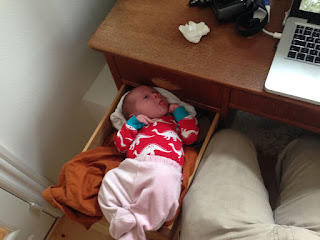Peregrine is now almost two months old, and we've slept with him in our bed with us from the very beginning, as we did with both his older sisters. I can hear the million voices crying out in horror, but hold on and let me explain why. The benefits, I hope are obvious (snuggles, not needing to wake up to nurse the baby, baby sleeping better, family bonding, etc.) but most people (in the US anyway) don't sleep in the same bed as their baby, don't feel allowed to, because the public health advice is that it can cause the infant to strangle or suffocate.
 |
| Zero day old Peregrine cosleeping (don't tell the nurses) |
| Tigerlily and Flopper, dressed for Halloween |
Blair et al. (1999). Babies sleeping with parents: case-control study of factors influencing the risk of the sudden infant death syndrome. British Medical Journal. 319, 1457-1462.
There are more recent papers on this conducted in several countries, and as far as I can see none of them have basically contradicted Blair et al.'s clearly stated "Key messsages" (sic):
Now, my wife and I do not smoke, do not drink, are not sleeping on a sofa, do not put the baby under a duvet, do not have overcrowded housing conditions and are merely very, rather than extremely, tired. As this 2016 study makes clear, cosleeping is often associated with overcrowding because people in poverty don't have the money for an extra room or an extra bed. Poverty increases the risk of almost all causes of death, especially infant deaths, and much of the risk from cosleeping may actually be risk from poverty. Our baby is under 14 weeks, but according to Blair et al.'s findings, without these other risk factors (particularly smoking), there is no increased risk associated with cosleeping, even for neonates.Key messsages
| Not child endangerment (with Tigerlily) |
This presents two obvious questions: How should parents who aren't trained in interpreting regression tables make this decision? And, why is the official US advice (which resembles that in several other countries) what it is?
My interpretation, based on Blair et al., and the studies that have followed from their work: Always sleep in the same room as the baby. (Shockingly, this has only now become the advice from the American Academy of Pediatrics) Never sleep on the couch with the baby (they tend to roll into the cracks, and this is truly dangerous). Don't cosleep with a baby under 14 weeks old if you are a smoker, are under the influence, are obese, are overcrowded (which is associated with poverty and all its ills), or are otherwise difficult to wake. If those risk factors don't apply to you, there are hundreds of hours of baby snuggling available to you, and you can decide to take them or leave the baby in a proper crib in your room. Quitting smoking is astoundingly good for your children's survival, even if you don't smoke inside the home.
Now why is the official advice a simple, "Never cosleep," or starker versions thereof? Because official advice has to be short and simple to be effective. My paragraph of advice, above, is 150 words. "Never cosleep" is two. "Don't live in poverty," would be great, if people were given the opportunity of escaping. People are, on the whole, really bad at following complex advice, and really good at finding reasons why things don't apply to them. Have my wife and I really never used a duvet with a baby? Questionable. Am I really overweight rather than obese? I haven't weighed myself in over a year. How tired is "extremely?" Have I ever fallen asleep on the couch with a baby? Certainly. You see, it gets messy, and it is easier for officialdom to just say, "No."
 |
| Baby Kestrel sleeping on the couch with Big Sister. Closely supervised. |
 |
| This baby (Kestrel) is not asleep. A desk drawer is not a proper crib. |

